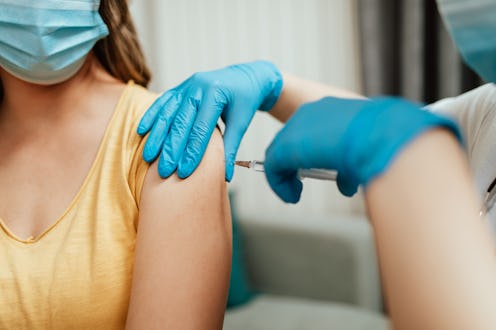Health
What An OB-GYN Wants You To Know If Your Period Is Weird Post-Vaccine
“I had the worst cramps of my existence.”

After Tessa, 21, got her second dose of the COVID-19 vaccine the last week of March, she was bracing herself for side effects like fatigue and fever. She didn’t have so much as a sore arm, but she did get her period for the first time in three years. The college junior said goodbye to her period after going on birth control pills when she was 16, and switched to an IUD without any issues in May 2020. But post-vaccine, she had period cramps so extreme she was worried she had an ectopic pregnancy.
“I had the worst cramps of my existence,” the college junior, who had never had painful periods even before going on the Pill, tells Bustle. “I couldn’t move.”
Menstrual issues aren’t a known side effect of the COVID-19 vaccine, but Twitter is rife with people sharing anecdotes like Tessa’s: “I have not bled in 6 months due to IUD but have been wiped out for 3 days and now have my normal beginning symptoms, stabbing pains (endometriosis) and cramps,” Tweeted one woman. “Wow the vaccine really did just give me a second period. OUCH. Ppl who menstruate beware!” warns another. On Reddit, threads are popping up on different channels to discuss whether the COVID-19 vaccine can affect your period, with caveats that the OPs don’t want their posts to be read as fear-mongering.
Stacy De-Lin, MD, a New York City-based gynecologist, explains that while there is now lots of data about COVID’s impact on the menstrual cycle — thanks mainly to the way the stress of being sick affects hormone function — there’s nothing to indicate that vaccination would do the same. The available COVID vaccines do not contain live virus (and so can’t cause any form of infection), and none of the known side effects cause severe stress or damage to your body. Further, De-Lin notes, while many people are expressing concern over the vaccine’s putative impact on their period, she stresses that it’s far more dangerous to contract COVID than to get vaccinated, particularly for pregnant people.
Abnormal uterine bleeding was never reported as a vaccine side effect in Pfizer’s clinical trials, which Pfizer confirmed in a statement to Bustle. Moderna and Johnson & Johnson, the makers of the other two FDA-authorized COVID vaccines available in the United States, did not respond to a request for comment from Bustle; neither company reported menstrual issues as vaccine side effects, either.
Tessa’s doctor told her there was “no way” there could be any connection between the vaccine and the change in her menstrual cycle. But she wonders why her period would suddenly return when nothing in her life changed except for getting protected against COVID. (Tessa clarifies that she is excited to have gotten the vaccine regardless of her cramps.)
De-Lin points to one small 2018 study on flu vaccinations’ impact on the menstrual cycle, which found a small, but not significant, decrease in progesterone in the luteal phase that could cause spotting. She also explains that some percentage of people who get the COVID vaccine experience a fever afterwards; fevers can delay ovulation, which could then change a person’s menstrual cycle for that month. But even then, De-Lin says, “I would expect the next cycle to return to normal.”
What’s most important for period-havers to know is that if they have any significant issues in their cycle post-vaccine — especially if those changes involve abnormal uterine bleeding — there’s likely another cause. De-Lin recommends people record any changes in their period; if your cycle is off for more than a month, go see a gynecologist for a detailed work-up, including testing thyroid levels, a Pap smear, and checking on any issues pertaining to blood clotting, cervical abnormalities, or potential pregnancy.
“If your periods are off and you think it’s just the vaccine, please don’t ignore those symptoms,” De-Lin says. “Go talk to a gynecologist.”
Expert:
Stacy De-Lin, MD
This article was originally published on